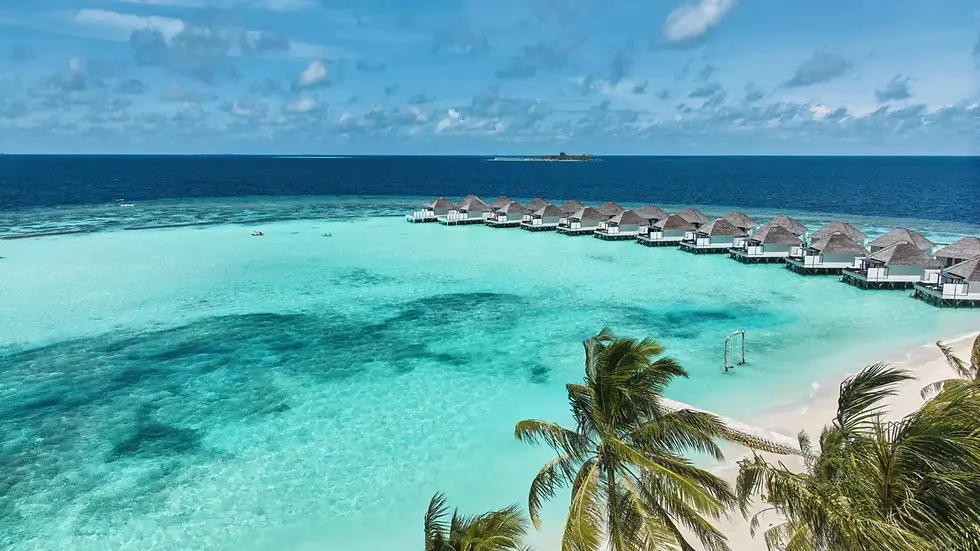Understanding Maldives Culture What Travelers Should Know
- SAURAV ANAND
- Oct 4, 2024
- 4 min read

The Maldives is often celebrated for its stunning white-sand beaches, crystal-clear waters, and luxurious resorts. However, there is much more to this tropical paradise than meets the eye. For travelers embarking on Maldives tours, understanding the local culture adds depth to the experience, making the trip truly memorable. Whether you’re planning a trip with Maldives tour packages or exploring independently, here’s a guide to understanding the rich culture of this island nation.
A Blend of Traditions
Maldivian culture is a vibrant fusion of South Asian, African, and Arabian influences. This mix is a result of centuries of trade and interaction with different civilizations. The island's strategic location on ancient trade routes brought influences that shaped the nation’s architecture, food, music, and religion.
The Role of Islam
Islam is the official religion of the Maldives, and it plays a central role in the daily lives of the locals. The country converted to Islam in the 12th century, and today, nearly all Maldivians follow Sunni Islam. Visitors should be respectful of Islamic customs, especially during the holy month of Ramadan. Dressing modestly is important, particularly when visiting local islands, mosques, or other cultural sites. While the resort islands offer more relaxed dress codes and behaviors, public displays of affection are still frowned upon outside these tourist zones.
The Maldivian Language
The official language of the Maldives is Dhivehi, a unique language with roots in Sanskrit and strong influences from Arabic and other neighboring regions. While most Maldivians speak English, especially in tourist areas, learning a few basic Dhivehi phrases can go a long way in connecting with locals. Phrases like "Shukuriyaa" (Thank you) and "Assalaamu Alaikum" (Peace be upon you) are simple but appreciated gestures of goodwill.
Maldivian Cuisine
Food is a significant part of Maldivian culture, with its cuisine heavily based on fish (especially tuna), coconut, and rice. Traditional Maldivian dishes like Mas Huni (a tuna, coconut, and chili mix) and Garudhiya (a fish broth served with rice) offer a taste of island life. When traveling on Maldives tours, make sure to indulge in local foods and fresh seafood. Many Maldives tour packages offer cultural dining experiences that introduce travelers to authentic Maldivian meals.
Folk Music and Dance
Music and dance are integral parts of Maldivian celebrations and traditions. Bodu Beru, meaning “big drum,” is the most well-known form of traditional music and dance. It features rhythmic drumming accompanied by dancing and singing, and it often marks special occasions like weddings and festivals. If you're lucky enough to witness a live Bodu Beru performance during your Maldives tour, you'll get to see a vibrant aspect of Maldivian cultural expression.
Artisanal Crafts
Maldivian craftsmanship is rooted in the island's history and way of life. Traditional handicrafts like Lacquer work (beautifully decorated wooden boxes), Mats made from reeds, and intricate Jewelry are popular among tourists seeking souvenirs. Many Maldives tour packages offer stops at local markets or workshops where travelers can witness artisans at work and buy handcrafted items directly from the source.
Respecting Local Etiquette
When visiting local islands or engaging with the Maldivian community, it’s essential to be mindful of local etiquette. Public behavior should be respectful, especially in areas away from tourist resorts. Avoid public displays of affection, dress modestly, and be conscious of local norms. For instance, topless sunbathing and alcohol consumption are strictly prohibited on local islands, though these activities are usually permitted in resort areas.
The Importance of Family and Community
Family is central to Maldivian life. Extended families often live together, and there is a strong sense of community. Visitors may notice that locals are very friendly, often greeting strangers with a warm smile or nod. When visiting the Maldives, it's important to remember that locals are generally reserved in public settings, but they are also incredibly hospitable.
Festivals and Celebrations
Maldivians celebrate various Islamic festivals, with Eid al-Fitr and Eid al-Adha being the most prominent. These are joyous occasions marked by communal prayers, feasting, and social gatherings. If you happen to visit during these festivals, you may get the chance to experience the festive spirit of the Maldives firsthand.
Environmental Stewardship
The Maldives is a nation deeply connected to its natural surroundings. As a low-lying island country, it is vulnerable to the impacts of climate change and rising sea levels. The Maldivian government, along with local communities, prioritizes environmental conservation and sustainable tourism. When visiting, travelers are encouraged to be environmentally conscious by avoiding plastic waste, respecting marine life, and participating in eco-friendly activities.
Final Thoughts
Whether you’re diving into the turquoise waters or relaxing on the beach, understanding Maldivian culture adds richness to your travel experience. Choosing Maldives tour packages that offer cultural insights, local dining experiences, and visits to traditional communities will help you gain a deeper appreciation for this island paradise.
By respecting local customs and traditions, you’ll not only enjoy the Maldives’ natural beauty but also connect with its warm-hearted people and fascinating culture. Whether it’s a family holiday, a romantic getaway, or an adventure-packed trip, understanding the essence of Maldivian culture will make your journey unforgettable.



Comments